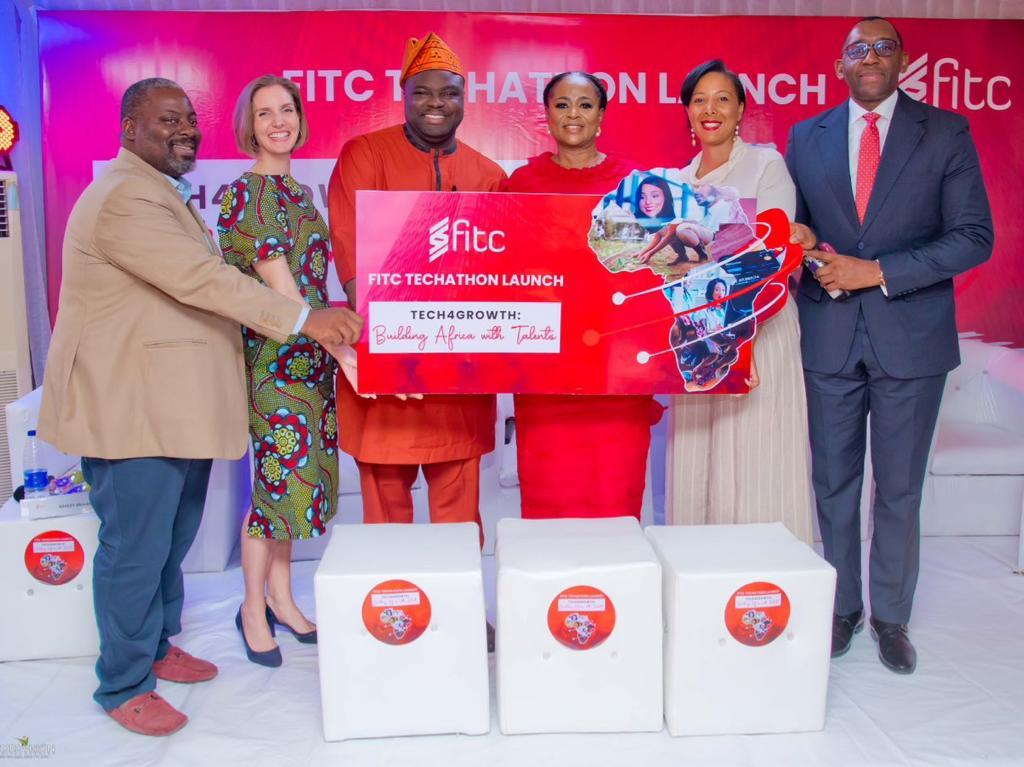FITC, the world-class, innovation-led, and technology-driven knowledge institution which provides learning, advisory services, and policy advocacy to the Nigerian financial service sector and other sectors of the economy, has once again ignited innovation through the launch of its much-awaited FITC Tech4Growth Techathon.
The highly anticipated FITC Tech4Growth Techathon officially kicked off on Tuesday, October 3rd, 2023, with a soaring turnout of distinguished judges, mentors, tech visionaries, and eminent figures from both the tech and financial services sectors, all converging to discuss the theme: “TECH4GROWTH: Building Africa with Talents.”
The Techathon is another one of FITC’s many innovative offerings targeted at youths and young people, aimed at equipping them with the essential skills and engagements required to thrive in the digital economy.
The event unfolded in two integral segments: a thought-provoking panel discussion and the official launch of the Techathon. The panel segment featured a dynamic group of industry leaders who provided invaluable insights into the role of technology in driving growth across the African continent. The panel session moderated by Chizor Malize, MD/CEO, FITC featured Technology experts and digital enthusiasts such as Iyinoluwa Aboyeji, CEO, Future Africa; Ashley Immanuel, COO, Semicolon; Iklima Musa Salihu, Special Assistant to the Director General (Strategy and Innovation) at the National Information Technology Development Agency (NITDA); Nkemdilim Uwaje Begho, CEO, Futuresoft, and Charles Emembolu, CEO, Crestsage Limited.
The event brought together thought leaders and industry experts from diverse background and sectors including Obi Asika, Convener, Omniverse; Niyi Ajao, Founder & CEO, Digital Finance Solutions Ltd; Obaro Odeghe, Executive Director, FCMB; Ngozi Udochukwu, MD, Olives Bloom; Chinwe Iloghalu, Executive Director, Polaris Bank amongst others. They gathered to add voice to the conversations around the growing need for a systematic development of technology talents to foster sustainable growth across Africa.
In her opening address, Managing Director/CEO, FITC, Chizor Malize, emphasized the need to build a sustainable talent ecosystem to achieve sufficient digital growth and technology development across Africa. She highlighted FITC’s intervention through the recently Launched TECH4Growth iEARTH Techathon, an acronym representing Innovation for Environment, Agriculture, Renewable Energy, Transportation, and Healthcare.
“The FITC Techathon would empower young minds from across Africa to embark on projects in critical domains, developing apps, businesses, innovations, and solutions. The transformative ideas from the Tech4Growth Techathon would then materialize into impactful projects and business opportunities, all under the guidance of over 28 mentors and judges” she added.
In his Keynote address, Abubakar Suleiman, Managing Director/CEO of Sterling Bank, who was represented by Taiwo Aluko, CIO, Sterling Bank highlighted the critical role of technology and innovation in Africa’s growth trajectory. He emphasized the potentials that can be harnessed with the nation’s talent pool and the increasing need to create tech jobs in Africa in order to accelerate economic growth. He stressed the need to empower youths to pioneer technological innovation for continental growth.
The COO of Semicolon, Ashley Immanuel, underscored Africa’s monumental potential. With projections indicating that the majority of the world’s working population will reside in Africa by 2040, she illuminated the continent’s standing as a source of formidable global talent.
Immanuel further advocated for a shift from a scarcity mindset to an abundance mindset, urging everyone to recognize that Africa possesses the talent and opportunities essential for its own growth and development.
Echoing Immanuel’s sentiments, the CEO of Futuresoft, Nkemdilim Uwaje Begho, emphasized the need for a mindset shift from traditional resources like oil and gas and the financial sector to nurturing the abundant wellspring of young African talents.
She called for policies that promote talent investment and make technology a central driver of socioeconomic development across various sectors. Begho further implored stakeholders to explore innovative models to leapfrog traditional approaches and position Africa for a prosperous tomorrow. “Africa is rising, and the critical factor is what we are doing today to be ready for tomorrow” she enthused.
In addressing the issue of availability of tech talents that may not align with industry needs, Begho highlighted the paramount importance of ensuring that talents are trained to meet the demands of industries. She stressed the necessity of forging strategic connections and securing funding to nurture talents and reduce attrition rates of tech talents in the sector.
In response to these thought-provoking insights, Malize underscored FITC’s tireless efforts in ensuring that the institute is meeting the pressing talent needs of the industry and creating opportunities for growth across all sectors. This is exemplified by initiatives like the iEARTH Tech4Growth Techathon, amongst other initiatives.
Charles Emembolu, CEO of Crestsage Limited, highlighted the existing gaps in various sectors due to the underutilization of technology. He astutely noted that some sectors have not yet recognized the depths of opportunities technology can unlock for them. To bridge these gaps, Emembolu advocated for the scaling up of talent training to reduce unemployment rates. He proposed leveraging existing resources such as innovation hubs, which provide fertile grounds for co-working spaces, incubation, and vibrant tech communities.
“There is also a crucial need to aggregate different training organizations and provide them with access to facilities, finance, and a pool of aspiring talents eager to acquire relevant tech skills” added Emembolu.
Iklima Musa Salihu, Special Assistant to the Director General (Strategy and Innovation) at the National Information Technology Development Agency (NITDA), provided valuable insights into the agency’s relentless efforts to develop and regulate IT in Nigeria. She further stated that “Tech has evolved as a powerful force for socioeconomic development, and Nigeria must capitalize on its comparative advantages, including a talented and youthful population”. She also pointed out the importance of favourable government policies, such as the Nigerian Startup Act, which NITDA actively implements. Salihu also highlighted advantageous factors that Nigeria possesses, such as the favourable time zone, English proficiency, and excellent accent compared to other African nations.
Salihu revealed that the agency is fervently collaborating with the Ministry of Communications, Innovation, and Digital Economy to leverage Nigeria’s brain capital and fortify the nation’s economy. She expressed that Nigeria possesses the talent to stand out on the global stage and emphasized the agency’s commitment to developing talents in tandem with the Ministry, led by Dr. Bosun Tijani, with the shared goal of creating 1 million jobs through the digital economy; an initiative which FITC has also contributed to developing its framework.
The CEO of Future Africa, Iyinoluwa Aboyeji, steered the discussion towards productivity enhancement through technology. He asserted that Nigeria should harness technology to bolster productivity and attract foreign investments, emphasizing the need to invest in local talents and retain tech spending within the country for maximum impact. “A partnership approach involving industries and talents is essential for harnessing technology’s power for growth” he said. He also expressed the missed opportunities of exporting productivity through technology, as many trained talents have not had the opportunity to contribute to local productivity.
Aboyeji’s assertion was echoed by the broader theme of a partnership approach to leveraging technology for productivity. This approach is pivotal to bridging the gap between talents and industries, ensuring that talents are maximally utilized to develop solutions that industries require. Aboyeji’s closing thoughts resonated deeply, emphasizing that for the Nigerian economy, growth is multidimensional, driven by forging partnerships between industries and talents to drive progress.
Overall, the distinguished speakers at the FITC Tech4Growth Techathon highlighted the immense potential of technology and talent development in Africa. They collectively underscored the need for forward-thinking policies, substantial investments, and a transformation of mindsets to fully harness these opportunities for sustainable growth and development.
The FITC Tech4Growth Techathon is a resounding call to drive innovation, foster entrepreneurship, and empower talent across Africa. It offers a robust platform for collaboration, mentorship, and investment opportunities within the technology sector. The event has set the stage for a promising future, wherein African talents will occupy a central role in building a tech-powered Africa.
With the success of the Tech4Growth Techathon launch, FITC continues to be at the forefront of Africa’s tech revolution. As the continent continues to innovate and grow, FITC remains a catalyst for positive change, bringing together the brightest minds to shape Africa’s future.
About the FITC Tech4Growth Techathon
The FITC Tech4Growth Techathon is a hackathon designed to bring together young and talented Africans to build innovative technology solutions for the continent. The Techathon is open to all Africans between the ages of 18 and 35, regardless of their experience or background. The Techathon aims to identify and support the next generation of African tech talents who will build the continent’s future and is expected to attract thousands of participants from across Africa and produce some truly groundbreaking solutions.
ABOUT FITC
FITC is a world-class innovation-led knowledge and professional services firm providing cutting edge Learning, Advisory and Research Services to clients in the Financial Services and other sectors, within and outside Nigeria.
Established in 1981 as a non-profit organisation limited by guarantee to provide capacity building and serve as a knowledge hub for the Nigerian Financial Services Sector. FITC is owned by the Bankers Committee, i.e., CBN, NDIC, and all deposit money banks in Nigeria.
For four decades, FITC has been at the forefront of innovative knowledge offerings designed for an array of C-suite executives, directors of banks and other financial institutions.
FITC is a recipient of the 2022, Silver Stevie Award for Company of the Year – Business/Professional Services and was also highly commended in 2022 for its Culture of Innovation by the Business Culture Awards. The organisation also won the 2021 International Business Excellence (IBX) Award, 2021 Global Business Excellence Award, 2020 Business Excellence Award (The BIZZ Award), 2020 Strategy Innovation & Change Award, International Federation of Training & Development Organisations (IFTDO) ‘Change Agent in Learning and Development in Africa’ Award, among others.











